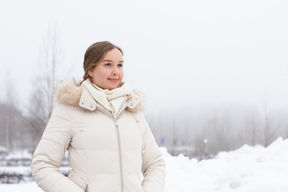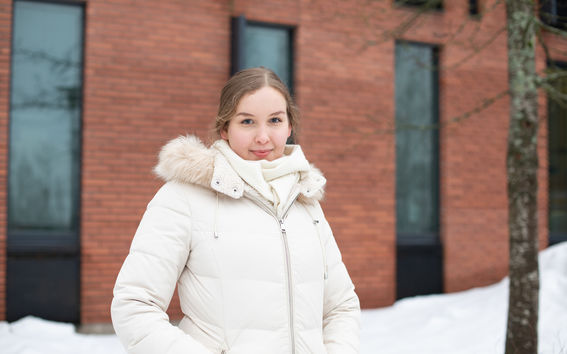If you study computer science, you may end up developing better cancer treatments by applying AI

Heli Julkunen, Master of Science (Technology), saw a great culmination point for her years at Aalto University in autumn 2020.
Towards the end of her studies, Julkunen took on a central role in a research project of Aalto, the Institute for Molecular Medicine Finland (FIMM), and the University of Turku that combined artificial intelligence and medical research. The project involved researchers developing a machine learning method which accurately predicts how different cancer drug combinations kill cancer cells. Julkunen’s master’s thesis on the subject was considered excellent and it received the Master’s Programme in Life Sciences Technologies award in the summer of 2019.
Julkunen graduated as a Master of Science in Technology in 2019 but continued her work on the subject and finalised an article on the project for publication, first alongside her day job and later as a project researcher for Aalto. In late 2020, the article was accepted for publication in the esteemed Nature Communications scientific journal. This was covered in news in Finland as well as abroad.
Combining different drugs in cancer treatments often improves the treatment’s effectiveness while also reducing its harmful side effects if the dosage of a single drug can be reduced. However, the experimental screening of drug combinations is slow and expensive, which increases the importance of utilising artificial intelligence (AI) methods.
Researchers trained the machine learning method with a large set of data from previous studies focused on investigating the associations between drugs and cancer cells. The results of the study revealed that the complex model discovered connections between drugs and cancer cells that were not observed with simpler models.
‘The method is based on a similar principle as recommendation systems behind applications such as Netflix and Spotify. Instead of recommending certain songs or films based on what other similar users like, the method can be used to predict how similar drug substances work together with other drug substances and different types of cancer cells’ says Julkunen.
This is precisely what fascinates her about data science and artificial intelligence: similar methods can be applied for very different use purposes and in different fields. ‘It’s really amazing, all the things you can do with data.’
Drawn to the possibilities of mathematics and physics
Julkunen was fond of school as a child and adolescent and liked several subjects. She spent her free time with friends and on the move. Her hobbies included horseback riding, swimming, and playing the Western concert flute.
Pursuing studies in the field of science after upper secondary school was not a given: Julkunen was also enthusiastic about literature and history, among other things. Medical studies interested her as well. ‘Instead of working as a medical doctor, however, I was more interested in the possibilities of technology in the healthcare sector.’
Heli JulkunenThe coding courses included in my basic studies and the studies in computer and data science made me realise how interesting all this is
Julkunen was admitted into Aalto University to study bioinformation technology, and as her minor, she studied computer science. At first, she did not quite understand all that computer science and data science include and can be used to do. ‘Yet the coding courses included in my basic studies and the studies in computer and data science made me realise how interesting all this is.’
Her interest in research was sparked during the second year of studies. Julkunen began to look into the different research groups at Aalto and sending emails to the people heading those groups. Professor Juho Rousu responded to her email and gave Julkunen a position as a summer intern.
Working as a research intern, she was able to put methods introduced in her studies to practice. At first, Julkunen began studying the interaction between drugs and proteins and the ways they could be predicted with the help of machine learning. After a couple of years, she was introduced to the study on cancer drug combinations.
During her master’s studies, Julkunen opted for the Master’s Programme in Life Science Technologies and chose Complex Systems as her major subject. She focused on data science, artificial intelligence, machine learning and bioinformatics, in particular. For the summer of 2017, she received a coveted scholarship to study at Stanford University in the United States.
‘The place was very much disposed towards entrepreneurship and the students were highly motivated. I completed a course on entrepreneurship that took me slightly out of my comfort zone. Studying at a top university abroad was a very encouraging and meaningful experience at that point in my studies.’
Placing interest and enthusiasm first
According to Julkunen, she has always been interested in applying artificial intelligence to the field of healthcare. It is a way to apply theory to ‘problems of the real world’ and do something meaningful for people’s health.
Upon graduation, Julkunen began working as a data scientist for Nightingale Health. The company seeks to develop preventive healthcare through data science; the goal is to reduce chronic illnesses by preventing and fighting them more effectively.
‘Based on blood analysis, we predicted the development of chronic diseases, and that way, we aimed to prevent them so that people could change their lifestyle and the direction of their health,’ Julkunen explains.
She considered beginning a doctoral thesis after graduation, but the projects at Nightingale piqued her interest. Even though Julkunen was happy working in the corporate sector, she didn't rule out postgraduate studies if she finds a topic that is interesting enough. ‘I’ve always wanted to carry out projects that are interesting and inspiring, instead of trying to take a certain pre-defined path.’
Autumn 2023 she came back to the campus for the postgraduate studies at the department of Computer Science.

Heli Julkunen, data scientist and alumna
Education: Master of Science (Technology) from Aalto University
From Hyvinkää
Lives in Espoo
Greatest academic or career achievement: Ascholarship to Stanford University and getting published in Nature Communications journal
Has also
Salsa dance as a hobby. ‘Dancing makes work stuff disappear; you can have fun, enjoy the music and let go.’
Done sky diving during her time at Stanford. ‘I did it despite my terrible fear of heights. I was brave enough to do it because I was following my friends’ example and I wanted to challenge myself. It was scary but fun!’
A high interest in learning new things. ‘I enjoy learning and trying new things also in my spare time, whether it’s investing in stocks or trying a new form of exercise.’
Read more news

Apply Now: Unite! Visiting Professorships at TU Graz
TU Graz, Austria, invites experienced postdoctoral researchers to apply for two fully funded visiting professorships. The deadline for expressions of interest is 20 February 2026, and the positions will begin on 1 October 2026.
Elina Pyylampi wants to combine renewable energy solutions and commerciality
The first-year student in Electrical Power and Energy Engineering wants to work with renewable energy and electrical systems.
Stop applying for jobs and build your own startup instead at Ignite
Applications for the Ignite summer accelerator program 2026 are open. Apply by March 8.






